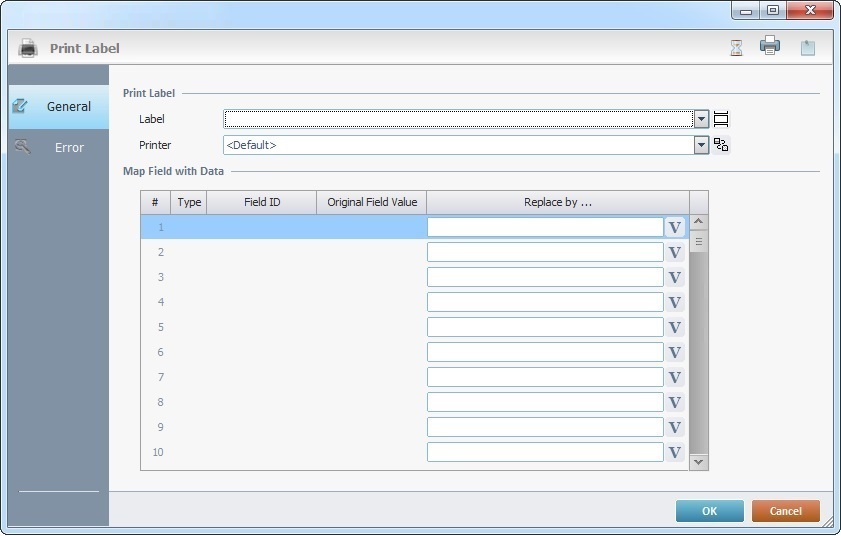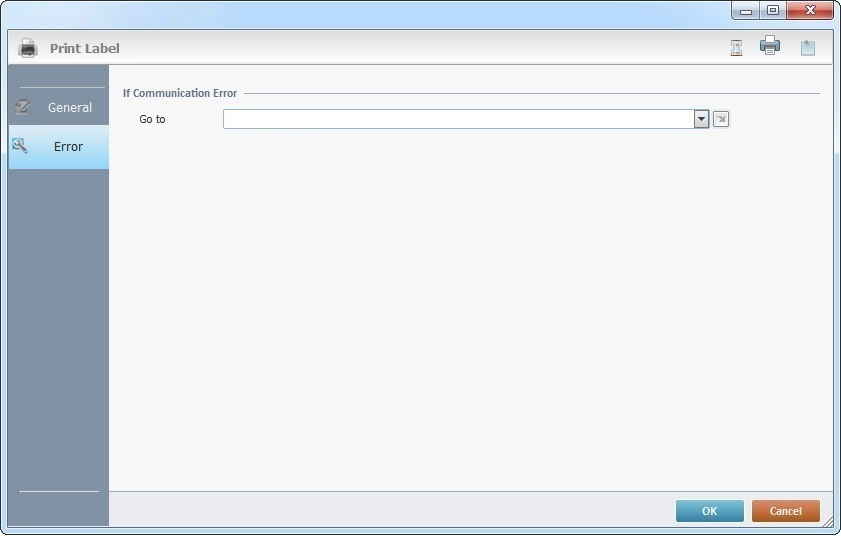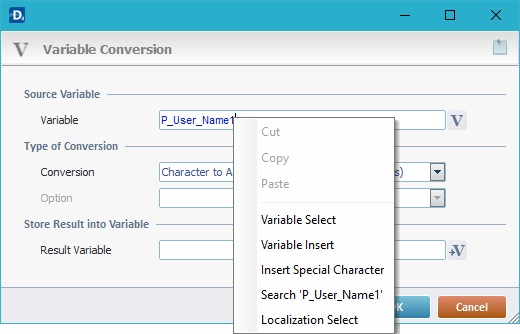Working with Print Label Process
Process Purpose
The "Print Label" process is used to print a label, specifically the label profile you created in the "Labels" module.
When you add a process, you are required to define its settings. This occurs in the process's properties window which is displayed automatically after having added the "Print File" process. This properties window is divided into two tabs - "General" and "Error".
If any subsequent edition is required, double-click the process to open its properties window and enter the necessary modifications.
"General" tab

Fill in the available options:
Print Label |
|
Label |
Select the label profile you want printed from the drop-down OR click |
Printer |
Select the appropriate printer profile from the drop down (which includes the default printer profiles and the ones you have already created). If required, click
Remember NOT to select a Serial Port Aux profile if your target device is an Android device. Serial Port type profiles are not supported if used in Android devices. |
Map Field with Data table |
|
Type column |
Refers the field value's string type. This information is retrieved from the label profile and it is NOT editable. |
Field ID column |
Refers the field ID you have set to replace the original field data in the label profile (see Label Profile). If there was NO Field ID replacement, it will be empty. This column is NOT editable. |
Original Field Value column |
Displays the original values of the label file that was used to create the label profile. This information is retrieved from the label profile and it is NOT editable. |
Replace by... column |
If required, you can replace each original field data with another value (a fixed value or a variable). Either enter it in the corresponding field(s) OR click |
This window displays all the label profiles available for the current project. It is accessed when you click Use the buttons to the right of the table to perform the following:
|
Go to the "Error" tab.
"Error" tab

Select/check the appropriate options:
If Communication Error |
|
Go to |
Select a target location from the drop-down or the
|
Detail of a ![]() window:
window:

"S:Menu" is a screen included in the same program as the process.
"R:Routine_1" is a routine included in the same program as the process.
Use the following icons (located on the upper right corner of the properties window) to execute specific operations:
•Click ![]() to define a time out for the label printing operation. See To Define a Time Out for a Print/Aux Process.
to define a time out for the label printing operation. See To Define a Time Out for a Print/Aux Process.
•Click ![]() to print a preview of the selected label profile.
to print a preview of the selected label profile.
![]() When selecting a printer, make sure that it is compatible, meaning, it must be able to read ZPL or DPL according to the language used in the label being printed.
When selecting a printer, make sure that it is compatible, meaning, it must be able to read ZPL or DPL according to the language used in the label being printed.
•Click ![]() to attach any relevant notes to this process. Click it and enter your notes in the resulting text box. These notes will be displayed in the corresponding "Actions" tab or "Process" window (in the "Notes" field) and in the "Developer Report".
to attach any relevant notes to this process. Click it and enter your notes in the resulting text box. These notes will be displayed in the corresponding "Actions" tab or "Process" window (in the "Notes" field) and in the "Developer Report".
After filling in the required options, click ![]() to conclude or
to conclude or ![]() to abort the operation.
to abort the operation.
The added process is displayed in the corresponding "Actions" tab or "Process" window.
![]() If you want to use a label as a target destination, you can use the "Auto-Label" mechanism. This alternative to the "Set Label" process allows you to create a label in the properties window of a process - specifically, in the fields used to define target destinations (ex: the "If Error..." type fields). See To Automatically Create a Label.
If you want to use a label as a target destination, you can use the "Auto-Label" mechanism. This alternative to the "Set Label" process allows you to create a label in the properties window of a process - specifically, in the fields used to define target destinations (ex: the "If Error..." type fields). See To Automatically Create a Label.
![]()
Use the right-click in MCL-Designer's input boxes to access some related options as well as the general "Cut", "Copy"; "Paste"; "Search" actions (active/inactive according to the current context).
Ex: If you right-click the "Variable" input box (included in a "Conversion's" properties window), you are provided with general editing/search actions and other more specific options such as "Variable Select" (see "Variable Select"); "Variable Insert" (see "Variable Insert"); "Insert Special Character" (see To Insert Special Characters into a Control's Text Input Field) and "Localization Select" (see Localization List).
If you right-click another input box, it may provide other possibilities.
